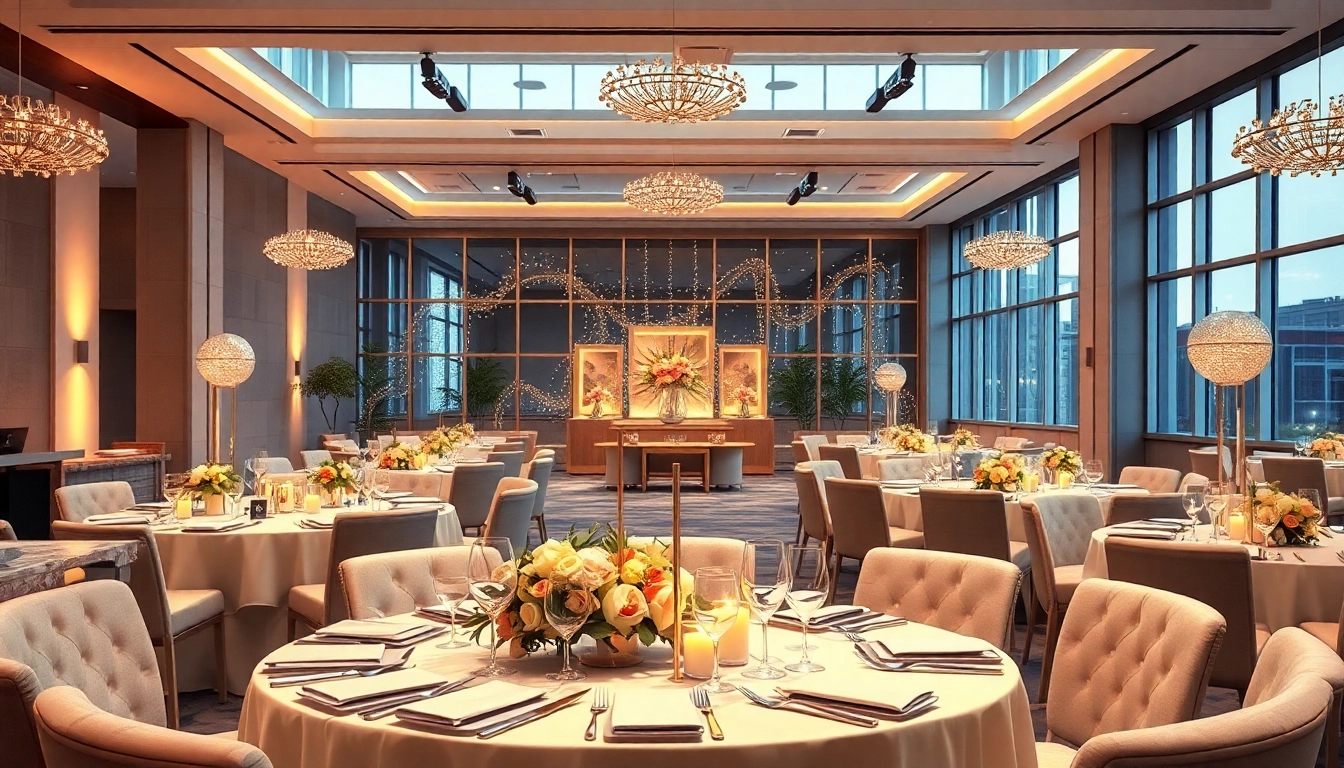Understanding Event Space Options
Choosing an event space for your gathering can significantly impact the overall success of your event. Whether you are planning a corporate meeting, a wedding, or a social gathering, understanding the different types of event spaces and their unique attributes is essential. This section will explore the various types of event spaces available, the factors that influence your selection, and how location can play a vital role in your decision-making process.
Types of Event Space
Event spaces come in various forms, each offering different atmospheres and functionalities. Here are the common types:
- Convention Centers: Large venues designed to host trade shows, conventions, and conferences. Equipped with multiple meeting rooms and large exhibit halls, they can accommodate thousands of attendees.
- Hotels: Many hotels offer event spaces, including ballrooms and conference rooms, which provide the added convenience of accommodation for guests.
- Unique Venues: These can include historical buildings, art galleries, rooftops, and warehouses, providing a distinctive setting that can greatly enhance the event’s theme.
- Outdoor Spaces: Parks, gardens, and event lawns suitable for open-air events, such as weddings and festivals, offering natural scenic beauty.
- Community Centers: More affordable options that typically offer versatile spaces well-suited for various gatherings, such as local meetings or family functions.
- Private Residences: Homes that can be rented for intimate gatherings or special occasions, allowing for a personal touch.
Factors to Consider When Selecting
Choosing the right event space involves critical evaluation of various factors that can influence the overall experience:
- Capacity: Ensure the space can comfortably accommodate all guests while allowing for movement and activities.
- Layout: Consider the space’s layout and how it aligns with your event’s programming, such as whether you need theater-style seating for presentations or round tables for dining.
- Location: The accessibility of the venue, including proximity to public transportation and parking availability, can determine guest attendance.
- Ambiance: The aesthetic qualities of the space, such as lighting, decor, and architecture, should complement your event’s theme or purpose.
- Facilities: Check for essential amenities such as restrooms, catering kitchens, and technology resources.
How Location Influences Choice
The significance of location cannot be overstated when selecting an event space. A well-chosen venue location can provide a seamless experience for your guests. Here are some key considerations:
- Accessibility: Locations that are easy to reach by public transport or offer ample parking facilities can vastly improve attendance.
- Neighborhood: The surrounding area can impact the perception of your event. A vibrant or prestigious locale adds value, while a less favorable area might deter guests.
- Proximity to Attractions: Being close to restaurants, hotels, or entertainment can enhance the overall experience for attendees, making it easy for them to explore before or after your event.
- Safety: Safety is paramount. Underlying crime rates and the general environment should be vetted to ensure guests feel secure.
Planning for Different Events
Each event type has specific requirements, and understanding these will help you choose the right event space. Below is a look at various event types and their unique considerations.
Corporate Events in an Event Space
Corporate events often require a professional and organized atmosphere. Here are some of the considerations:
- Technology Needs: Many corporate events require extensive audiovisual setups, such as projectors, screens, and sound systems. Ensure the venue can accommodate these needs.
- Breakout Rooms: If your event will cover multiple topics or sessions, the space should have breakout rooms available for smaller group discussions.
- Catering Services: Consider if the venue has on-site catering or partnerships with local caterers to provide meals and refreshments.
- Networking Areas: Spaces conducive to networking, such as lounges or reception areas, help foster connections among attendees.
Weddings and Receptions in an Event Space
Planning a wedding requires not only finding the perfect venue but also ensuring that it can accommodate all your needs for the day:
- Capacity and Layout: Ensure the venue can host your guest list and provides space for the ceremony, reception, and dancing.
- Customization: Many couples prefer venues that allow personalization in decor and layout for their wedding day.
- Décor and Ambiance: The aesthetic quality of the venue should match the desired wedding theme, whether it’s formal, rustic, or modern.
- Logistics: Make sure the venue has adequate facilities for catering, changing rooms, and accessibility for guests with special needs.
Social Gatherings: Parties and Celebrations
When planning parties or social celebrations, it’s important to consider the vibe you wish to create:
- Atmosphere: Choose a venue that matches the event’s atmosphere, whether it’s a lively birthday party, a serene baby shower, or a formal anniversary celebration.
- Outdoor vs. Indoor: Depending on the season and type of gathering, think about whether you want an outdoor space or an indoor setting.
- Food and Drink Options: Evaluate whether the venue allows catering or whether you need to hire outside vendors for food and beverages.
- Entertainment: Consider spaces that allow for entertainment setups, such as bands, DJs, or games, depending on the nature of the gathering.
Amenities that Enhance Your Event Space Experience
The experience of an event space is often elevated by the amenities available. Here, we explore the critical facilities that can enhance your event:
Technology and Audiovisual Needs
Technology has become integral to events, and understanding your technological needs can help you choose the right venue:
- Wi-Fi Access: Reliable internet access is crucial for almost all events, especially for corporate ones where presentations are made online.
- Audio Systems: A sound system that facilitates clear audio for speeches and music is essential. Check if rental options are available if the venue doesn’t have its own.
- Lighting: Strategic lighting can transform the space to set the mood. Venues with adjustable lighting systems may offer great flexibility.
- Projection Equipment: If your event requires presentations, ensure the venue has the necessary projection equipment.
Catering Options for an Event Space
Catering can make or break an event. It’s important to understand your options:
- On-Site Catering: Many venues provide comprehensive catering services that include a variety of menu options.
- External Catering: Some venues allow outside catering, which can provide you with greater flexibility in selecting your preferred cuisine.
- Custom Menus: Look for venues that offer customizable menus to better align with your theme and guests’ dietary needs.
- Service Style: Decide on the type of service (buffet, plated, cocktail) and whether the venue can accommodate this effectively.
Accessibility and Parking Considerations
The accessibility of an event space can greatly impact guest attendance and comfort:
- ADA Compliance: Ensure the venue complies with the Americans with Disabilities Act to cater to all guests.
- Parking Facilities: Adequate parking space or nearby parking options are vital, especially for larger events.
- Public Transport Links: Venues close to public transport will make it easier for guests who may not drive.
- Drop-Off Zones: Having designated drop-off and pick-up points can ease the experience for guests.
Budgeting for Your Event Space
Another critical aspect of planning an event is budgeting. Understanding the costs associated with renting an event space can help ensure you stay within financial limits:
Understanding Rental Costs and Fees
When budgeting for your event space, it’s important to be aware of all costs. Rental agreements may include:
- Base Rental Fee: The primary fee for using the venue, which can vary widely based on size, location, and amenities.
- Security Deposit: Many venues require a refundable security deposit to cover potential damages.
- Service Charges: Be attentive to any additional charges for services such as cleaning, security, and setup fees.
- Catering Costs: If the venue provides catering, budget for food, beverages, and service fees.
Negotiating Terms with Venue Managers
Don’t hesitate to negotiate terms and pricing when discussing rental agreements:
- Package Deals: Some venues offer packages that include catering and other services, which can be more cost-effective.
- Off-Peak Pricing: Consider hosting the event during off-peak times to take advantage of discounted rates.
- Length of Event: Depending on event duration, negotiate additional hours if necessary to avoid overtime charges.
- Payment Plans: Inquire if the venue allows for payment plans or deposits to spread out costs.
Cost-effective Tips for Maximizing Value
To maximize your budget while renting an event space, you can:
- DIY Decor: Create your decorations where possible to reduce costs while adding a personal touch.
- Leverage Your Network: Utilize your contacts for services like photography, entertainment, and catering for potential discounts.
- Estimate Attendance Accurately: Make sure your guest list is realistic to avoid paying for unused space.
- Assess Hidden Costs: Read the fine print in contracts to understand and account for all potential additional charges upfront.
Maximizing the Impact of Your Event Space
The outcome of your event often relies on how well you leverage your chosen event space. Here are strategies to enhance its impact:
Networking Opportunities Within the Space
Facilitating networking can greatly enhance the value of your event. Consider the following approaches:
- Designated Networking Areas: Create informal meeting zones with seating to encourage conversations among attendees.
- Interactive Sessions: Incorporate breakout sessions or group activities that promote mingling and collaboration.
- Facilitating Introductions: Plan ice-breaking sessions where attendees can introduce themselves and share interests.
- Utilizing Technology: Interactive event apps can help attendees connect, schedule meetings, and share their details easily.
Catering to Different Guest Experiences
Each guest may have a unique experience and understanding their preferences can enhance satisfaction:
- Theming: Consider a thematic approach that resonates with guests and enhances their experience at the venue.
- Multiple Food Options: Ensure dietary restrictions are accommodated by offering a diverse menu that everyone can enjoy.
- Activity Stations: Engage guests with varied experiences such as photo booths, live demonstrations, or interactive displays.
- Feedback Mechanisms: Collect feedback during the event to gauge satisfaction and address any concerns in real-time.
Post-event Follow-up Strategies
A successful event does not end when guests leave. Follow-up strategies help maintain relationships and capture insights:
- Thank You Notes: Send handwritten thank you notes to guests and vendors to show appreciation and foster connections.
- Event Surveys: Collect feedback through surveys to gain insights into what worked and what could be improved for future events.
- Sharing Highlights: Share event photos and highlights on social media and send them through newsletters to keep the momentum alive.
- Networking Groups: Create follow-up networking opportunities for attendees to connect further after the event has concluded.



